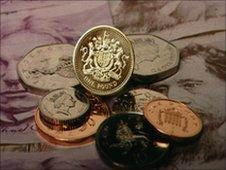Trading conditions improve for Scottish businesses
- Published

Output growth was the fastest seen in the last three months
The latest survey of business activity across Scotland has shown improved trading conditions.
Overall, output is gaining pace with 11 straight months of growth, according to the latest Bank of Scotland Purchasing Managers' Index (PMI) report.
However, growth is slower than across the rest of the UK, and there are concerns about rising inflation.
Prof Donald MacRae, the bank's chief economist, said output growth was showing a "welcome recovery".
Managers reported the fastest pace of recruitment growth since last October, according to the survey.
That remains modest, but some of it is due to company expansion and less slack in demand, with a decline in backlogs of work.
A major worry affecting businesses last month was rising input costs, many of them imported components for Scottish manufacturers.
Businesses are also under pressure from competitors not to pass those costs on.
Prof MacRae said the output growth was the fastest seen in the last three months.
He said: "After a worrying two-month period of decline, service sector activity has returned to growth in May, reporting a promising rise in new business for the first time in three months.
"However, the sharp rise in average input costs during May is of concern, with the pace of inflation again faster than that seen in the wider UK economy."
He said the Scottish economy was slowly emerging from recession, but at a slower pace than the UK as a whole.
Meanwhile, the Scottish Chambers of Commerce has raised concerns about the impact on economic growth if the UK government increases capital gains tax (CGT).
Chancellor George Osborne is expected to spell out how it might be brought closer into line with income tax in the forthcoming Budget on 22 June.
At present CGT is 18%, whereas income tax on higher earners runs at 40% and 50%.
A survey by the Scottish Chambers found a high level of concern over the issue, with some companies already taking action in anticipation of the increased tax rates.
'Fragile recovery'
Chief executive Liz Cameron said businesses recognise the need to tackle the budget deficit, but warned the government will have to explain tax increases with "a clear rationale".
"Many businesses are clearly unconvinced of the wisdom of imposing dramatic increases in the rates of CGT during a phase of fragile economic recovery," she said.
"If a rise in CGT is unavoidable, then there must be clear exemptions and reliefs for business activity alongside taper relief and indexation."
She added: "Government must remember that economic recovery and deficit reduction will ultimately be down to business to deliver, and we need the resources and encouragement to develop new business opportunities and create new jobs."
The British Chambers of Commerce has called on the new chancellor to include the health and overseas aid budgets in his deficit reduction plans.
Mr Osborne has promised to protect both, but the Chambers said that has not been explained properly, and it will force more drastic cuts to other programmes, particularly in capital investment.
The BCC has also urged the coalition government to impose an immediate two-year freeze on the total public sector pay bill.
- Published22 May 2010